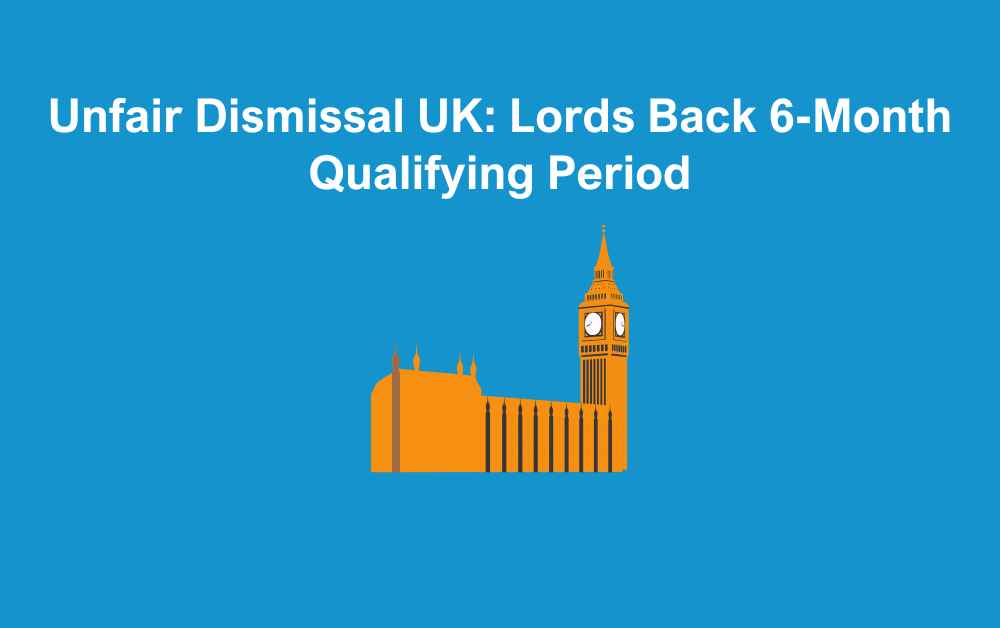The UK’s proposed Employment Rights Bill continues to progress through Parliament, bringing with it some potentially transformative changes to how employers manage dismissals. One of the most significant developments is The House of Lords’ recent vote to reduce the qualifying period for unfair dismissal UK claims from two years to just six months. This comes as an alternative to the government’s initial proposal of a ‘day one right’ with a protected 9-month period for employers. Here’s what employers need to know.
What Is the Current Law on Unfair Dismissal?
Under current UK law, employees need two years of continuous service to qualify for protection against ordinary unfair dismissal. If dismissed before reaching this point, they usually can’t bring a claim unless the reason is automatically unfair. Automatically unfair would include discrimination, whistleblowing, or health and safety issues.
This is known as short service dismissal. While employers must still act fairly and follow basic procedures, dismissing an employee with less than two years’ service is typically more straightforward and carries less legal risk. These employees are also usually not entitled to redundancy pay, unless stated otherwise in their contract. You should however always take advice before ending the employment of an employee with less than 2 years service, as they could still bring a claim if they meet one of the characteristics under the Equality Act.
What Did the Government Originally Propose?
As part of the new Employment Rights Bill, the UK Government proposed a significant shift in the way unfair dismissal UK claims are handled. One of the headline changes was to give employees the right to claim unfair dismissal from day one of their employment. This would remove the current two-year qualifying period.
However, to balance the new protection, the proposal included a nine-month ‘initial period of employment’ for employers. During this time, employers could dismiss staff without unfair dismissal claims, unless the reason was automatically unfair or discriminatory. This created a short window that still offered employers some protection in the early stages of employment. After the nine months, employees would gain stronger rights to claim unfair dismissal.
The aim of the government’s proposal was to increase job security. It was also in an aim to reduce the number of workers who currently fall short of the two-year threshold. This is especially in cases where dismissals might be seen as unfair but don’t meet the legal criteria to be challenged.
The New Proposal of a 6-month probation period
The House of Lords has voted to scrap the idea of a nine-month ‘initial period of employment’ altogether. They are instead choosing to introduce a simpler change by reducing the qualifying period for unfair dismissal UK claims from two years to six months. This decision was made in order to:
- Faster Implementation: A straightforward reduction to six months is simpler to put into law and avoids the complexity of introducing a new ‘initial employment period’ with its own rules and exceptions.
- Clearer for Employers and Employees: The six-month qualifying period is easier to understand and communicate. It removes ambiguity about when employees gain rights and what protections apply during the early stages of employment.
- Avoids Additional Legal Complexity: Introducing a new category of dismissal law—such as a protected nine-month period—would likely require extra legislation, guidance, and clarification. Reducing the qualifying period achieves a similar goal without adding red tape.
- Greater Security for Workers: More employees would gain access to unfair dismissal rights earlier in their employment. This will help to reduce vulnerability during the probationary period.
- Reduces Pressure on Employment Tribunals: By keeping the process more straightforward and limiting legal loopholes or exceptions, the change could prevent a surge in disputes over how and when protections apply.
The Bill will now return to the House of Commons. We should soon find out if the Government will reinstate its original proposal for a day one right. Alternatively, the six-month qualifying period backed by the House of Lords may remain in place.
What does this mean for Employers?
Whether the original proposal is upheld or the 6-month qualifying period amendment goes ahead, employers should prepare for a notable change to unfair dismissal UK rights. A shorter qualifying period means adjustments will be needed in how new staff are managed.
Key implications include:
- Shorter Time to Assess New Hires: Employers will have less time to evaluate performance, conduct, and suitability before unfair dismissal protections apply.
- Increased Importance of Probation Periods: Probation reviews must be well-structured, with regular feedback and clear documentation to support any concerns.
- More Focus on Onboarding: A solid induction process will help identify issues early and give new employees the best chance of success.
- Caution Still Needed with Early Dismissals: Automatically unfair reasons, such as discrimination or whistleblowing, still apply from day one. In addition, decisions must be well-considered and documented.
- Review Contracts and Policies: Employers should ensure employment contracts and internal procedures are up to date.
- Manager Training: Managers should be briefed on the new timeframes and trained to handle early-stage performance or conduct issues fairly and legally.
With change on the horizon, reviewing internal processes now will help employers stay compliant and minimise legal risk.
When will it Become Law?
Any changes to probation periods and the qualifying period for unfair dismissal UK are not expected to take effect until 2027. However, the proposed legislation must first pass through Parliament before becoming law.
Contact Us
If you have any questions around Unfair Dismissal UK, and the proposed 6-month probation period, contact us. Our team of HR experts are here to help.







